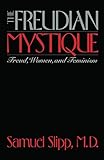The Freudian Mystique : Freud, Women, and Feminism / Samuel Slipp.
Material type: TextPublisher: New York, NY : New York University Press, [2020]Copyright date: ©1993Description: 1 online resourceContent type:
TextPublisher: New York, NY : New York University Press, [2020]Copyright date: ©1993Description: 1 online resourceContent type: - 9780814779682
- 9780814788929
- 150.19/52/082 20
- online - DeGruyter
| Item type | Current library | Call number | URL | Status | Notes | Barcode | |
|---|---|---|---|---|---|---|---|
 eBook
eBook
|
Biblioteca "Angelicum" Pont. Univ. S.Tommaso d'Aquino Nuvola online | online - DeGruyter (Browse shelf(Opens below)) | Online access | Not for loan (Accesso limitato) | Accesso per gli utenti autorizzati / Access for authorized users | (dgr)9780814788929 |
restricted access online access with authorization star
http://purl.org/coar/access_right/c_16ec
"Lucid and convincing.Makes clear that [Freud's] vision was limited both by the social climate in which he worked and the personal experiences he preferred, subconsciously, not to deal with."-Los Angeles Times Sigmund Freud was quite arguably one of the most influential thinkers of the twentieth century. Yet, over the last decade, portions of his theories of the mind have suffered remarkably accurate attacks by feminists and even some conservative Freudians. How could this great mind have been so wrong about women? In The Freudian Mystique, analyst Samuel Slipp offers an explanation of how such a remarkable and revolutionary thinker could achieve only inadequate theories of female development. Tracing the gradual evolution of patriarchy and phallocentrism in Western society, Slipp examines the stereotyped attitudes toward women that were taken for granted in Freud's culture and strongly influenced his thinking on feminine psychology. Of even greater importance was Freud's relationship with his mother, who emotionally abandoned him when he was two years old. Slipp brings the tools of a trained clinician into play as he examines, from an object relations perspective, Freud's own pre-oedipal conflicts, and shows how they influenced Freud's personality as well as the male-centric shape of his theory.Not limited to only one perspective, The Freudian Mystique analyzes how the entire contextual framework of individual development, history, and culture affected Freud's work in feminine psychology. The book then looks forward, to formulating a modern biopsychosocial framework for female gender development.
Mode of access: Internet via World Wide Web.
In English.
Description based on online resource; title from PDF title page (publisher's Web site, viewed 01. Nov 2023)


